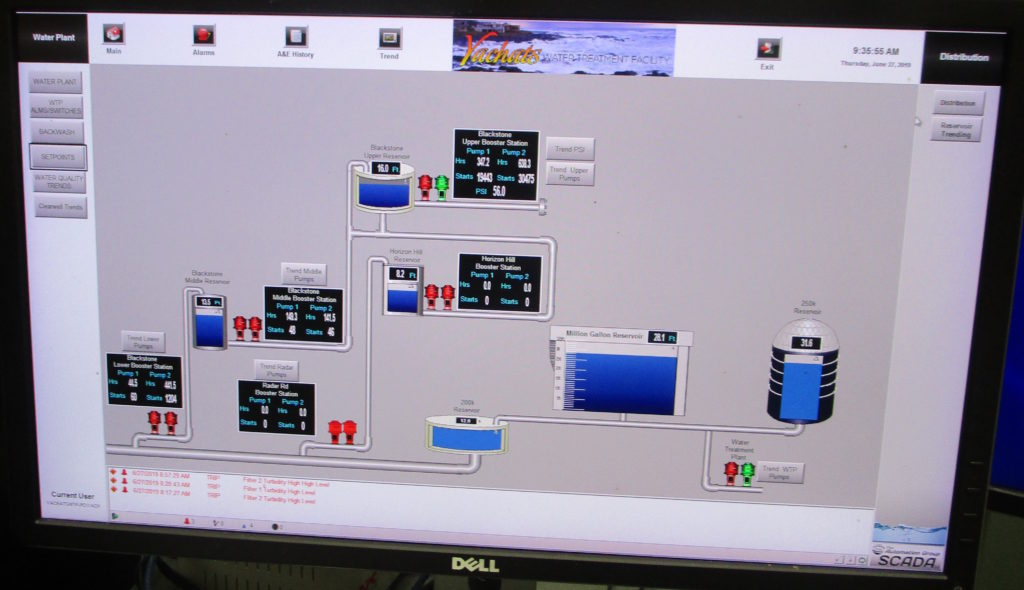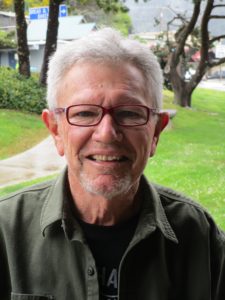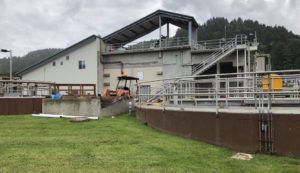
By GARRET JAROS/YachatsNews
YACHATS – The Yachats city council voted Wednesday to raise water and sewer rates for commercial users – including vacation rentals – to plug a funding gap and strive toward parity with residential rates.
There is a notable difference in rates paid by large users and residents, according to city officials, prompting the question of how to achieve a more equitable balance while also raising revenue to bring in an additional $200,000 a year.
Toward that end the city’s finance committee proposed a handful of commercial rate adjustments for the city council to consider. On Wednesday, councilors passed three of those suggestions — eliminating water included in a commercial user’s base rate; charging 125 licensed vacation rentals 25 percent more than residential users; and equalizing rates for large users, several of which have underpaid for years because of a clerical error.
All told those changes will increase revenue by approximately $118,700.
Eliminating the inclusion of water with base rates for commercial customers is anticipated to bring in an additional $55,600 a year. Increasing vacation rental rates is expected to garner $42,400, and equalizing the amounts paid by large users will contribute $20,700.
Until they get legal advice, the council chose to defer another finance committee proposal to charge a monthly fee of $55 to owners of vacant lots who prepaid system development charges years ago but have yet to develop the properties.

“Some of these go back 40, 50 years,” explained finance committee member Tom Lauritzen during a city council work session Monday. “They paid a couple thousand bucks for their water SDCs, which are now worth ($7,000 to) $8,000 dollars.”
While those owners have benefited by owning a proportionate share of today’s water system, they have avoided paying for its cost and upkeep over the intervening years, Lauritzen added.
“Finance theory is if you are going to own a piece of our infrastructure you need to be supporting it along the way,” he said.
The fee of $55 was derived at by halving the monthly water and sewer base rate paid by residential households. If the council was to approve what is being called a “ready-to-serve fee” it is estimated to bring in an additional $63,400 a year.
An added benefit of a charge would be to incentivize development and increase housing inventory, Lauritzen said. Another consideration, which the finance committee “is leaning toward” is recommending a grace period for the lag time between paying system development charges and finding a contractor to start building – which on the central Oregon coast can sometimes take two or three years.
But there are 93 empty lots with prepaid system development charges, of which about 87 have been vacant for more than three years, Lauritzen added. “They’ve had plenty of time to find a contractor and build a house.”
Mayor Craig Berdie added that although it will take some further study, so far as he knows Yachats is the only city that allows people to pay system development fees prior to a getting a building permit.
Vacant lots without prepaid fees would not be affected. Councilors will revisit the issue at its next meeting, which has been rescheduled for Oct. 23.
Reason behind raising rates
The city’s 20-year master plan for water and wastewater identified $21 million in projects that should be tackled in the next 20 years.
Previously, the public works enterprise funds, water and sewer capital reserves received $200,000 annually from the city’s general fund to go toward capital improvement projects identified in the plan, according to the city. It was further projected that contribution would need to be replaced by the enterprise fund’s utility rates in 2023.

While that explains the long-term, in the short-term the city’s general fund took a hit this fiscal year by adding the part-time services of a sheriff’s deputy, as well as covering other unrelated incidental costs.
The decision to increase rates for commercial users while sparing residential users is twofold. One is to reach parity between what businesses pay versus what residents pay.
Currently residents use 53 percent of the water but pay 72 percent of the cost, said finance committee member Julie Ekdom.
“So we are definitely subsidizing,” she said. “I don’t think anybody is surprised by that. We’re going to have to keep doing that to a certain extent, but we would like it to be a little bit more equitable.”
The other reason residential users are getting a pass for now is because they anted up in the past. The city had been losing money selling water so in 2015 it implemented a base-rate charge to residential users for two units of water or 1,496 gallons despite the fact most residents used one unit — 748 gallons or less, Lauritzen said.
“We came up with this two-units included to raise enough money to get our contributions to reserves back in to a positive status,” he said. “It was painful because there were a lot of single resident households in town that were using one unit … So the residents did their share back in 2015-2016.”
Rates
To gain an understanding of the rate adjustments for commercial users it helps to start with the average residential rate. The vast majority of Yachats residents — 700 out of 742 — have a 5/8-inch water meter for which they pay a base rate of $56.99 a month. That includes two units of water.

With the calculation of “water in equals water out,” residents also pay a monthly sewer fee of $56.60 for a total bill of $113.59. Every unit beyond that incurs an additional charge of $7.08 a unit.
Eliminating the two included units for vacation rental properties while also tacking on a 25 percent rate increase, raises their monthly bill nearly 37 percent above the cost of a residential user.
Councilor Barry Collins said he was “unenthusiastically in agreement” in voting along with the rest of the council to increase vacation rental rates, to which Berdie agreed.
“My sense of (this) is that it’s correct and right,” Berdie said. “I understand the burden it will place on some people that do not rent their units regularly and that don’t rent their units possibly in the winter. But …when you decide to become a vacation rental holder you are becoming a commercial business and it’s the additional cost of doing business.”
Restaurants, hotels and motels, bed-and-breakfasts, C&K Market, Dollar General and motels with restaurants will see increases ranging from 4 percent to 10 percent depending on meter size and water use.
Notification and implementation
Notification of the elimination of water included in commercial users’ base rate will be sent out in October for implementation in November.
Vacation rentals will be notified of the 25 percent increase in their base rate in October but it will not be applied until license renewal in January.
Notification of large-user equalization will go out in November and take effect in December.
The goal of the finance committee was not to remedy the revenue structure for water and sewer all at once, said Lauritzen, who recognized how difficult that would be for business owners.
“But every decision that we make going forward should be directionally correct toward getting this to parity at some point,” he said at Monday’s council work session.
“So we are looking for areas that we can be creative in, raise some revenue, hit the goal and not penalize our fulltime residents. This seemed like a pretty straightforward approach.”
- Garret Jaros is YachatsNews’ full-time reporter and can be reached at GJaros@YachatsNews.com



As usual, Garret Jaros takes the complex and makes it understandable. His articles are consistently well-written. Much appreciation to Yachats News and Garret.
I’m encouraged by the City’s decision to try and create some parity for water users in Yachats. I have lived here for 22 years and I seldom go over the one unit of water–but pay the minimum amount as a residential user. I have jokingly told my friends that in Yachats you pay for your water by the ounce. I have lived in numerous states over the years and Yachats is the most expensive place for water/sewer. I’m sure the big hotels will fight this–they fought the small Food/Beverage tax that helps offset the costs of our water treatment plant–and the residents of Yachats voted to accept the tax on take out food and food consumption in our restaurants. We eat uptown too–and it’s nice to see that the many tourists are paying a small share of the cost of the water system. Thanks for the detailed reporting!
Water and sewer rates in Yachats may not be as out of line as you think. I live just north of the city limit and get water from SW Lincoln which, at first look, seems to be much less expensive — my water bill for one unit is approximately $50/month. But, I also have a septic system that requires a yearly monitoring and maintenance contract and a yearly filing with the County; that adds $40/month. The installation cost of the septic system is about $25,000 which is substantially more than the cost of hooking up to the city system. One could argue that the cost of water and sewer in the areas north of Yachats (for new construction at least) is greater than the cost in Yachats.
Thank you for the excellent reporting (as usual) Yachats News.
My wife and I fall into the category of home owners that Mayor Bernie described in his statement “I understand the burden it will place on some people that do not rent their units regularly and that don’t rent their units possibly in the winter. But …when you decide to become a vacation rental holder you are becoming a commercial business and it’s the additional cost of doing business.” This comes across as tone deaf to those that will be hurt by this policy and him justifying why to punish those of us who have chosen to share our homes just to cover the high costs of living in Yachats. We have also been part of the residents who have also subsidized the cost since 2015, when we never come close to the 1 unit of water. It is disappointing that the town chooses to vilify all STRs and treat these residence as an ATM whenever they see a budget hole and charge STRs higher rates than the hotels and other businesses on taxes and now water we don’t even use.
This is how we encourage “Buy Local”? You mention “the cost of doing business.” With food costs becoming unaffordable I see you’ve included in the increase to CK market, and Dollar General as well as restaurants (who are already at a disadvantage) adding sales tax to the cost for customers they serve. This only contributes to the benefit of huge corporations such as Amazon who has the advantage of selling items similar to Dollar General, CK Market and local crafters without contributing a dime to Yachats “cost of doing business.” They pay zero toward property tax, sales tax, lodging tax, utilities, road maintenance, the part-time sheriff mentioned, or any other costs locals are made to pay. I guess it’s just easier to go after the little guys.